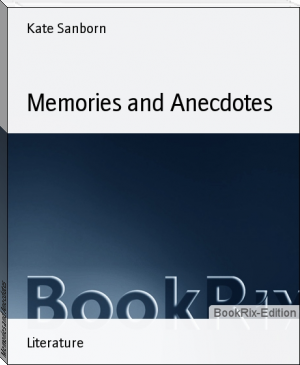Anecdotes of Painters, Engravers, Sculptors and Architects and Curiosities of Art (Vol. 3 of 3), S. Spooner [e novels for free .TXT] 📗

- Author: S. Spooner
Book online «Anecdotes of Painters, Engravers, Sculptors and Architects and Curiosities of Art (Vol. 3 of 3), S. Spooner [e novels for free .TXT] 📗». Author S. Spooner
arrival, set before him all the difficulties, from the greatest to the
smallest, which had been made by the masters, who were present, together
with himself, at the audience: whereupon Filippo replied in these
words--'Gentlemen Superintendents, there is no doubt that great
undertakings always present difficulties in their execution; and if none
ever did so before, this of yours does it to an extent of which you are
not perhaps even yet fully aware, for I do not know that even the
ancients ever raised so enormous a vault as this will be. I, who have
many times reflected on the scaffoldings required, both within and
without, and on the method to be pursued for working securely at this
erection, have never been able to come to a decision; and I am
confounded, no less by the breadth than the height of the edifice. Now,
if the cupola could be arched in a circular form, we might pursue the
method adopted by the Romans in erecting the Pantheon of Rome; that is,
the Rotunda. But here we must follow the eight sides of the building,
dove-tailing, and, so to speak, enchaining the stones, which will be a
very difficult thing. Yet, remembering that this is a temple consecrated
to God and the Virgin, I confidently trust, that for a work executed to
their honor, they will not fail to infuse knowledge where it is now
wanting, and will bestow strength, wisdom, and genius on him who shall
be the author of such a project. But how can I help you in the matter,
seeing that the work is not mine? I tell you plainly, that if it
belonged to me, my courage and power would beyond all doubt suffice to
discover means whereby the work might be effected without so many
difficulties; but as yet I have not reflected on the matter to any
extent, and you would have me tell you by what method it is to be
accomplished. But even if your worships should determine that the cupola
shall be raised, you will be compelled not only to make trial of me, who
do not consider myself capable of being the sole adviser in so important
a matter, but also to expend money, and to command that within a year,
and on a fixed day, many architects shall assemble in Florence; not
Tuscans and Italians only, but Germans, French, and of every other
nation: to them it is that such an undertaking should be proposed, to
the end that having discussed the matter and decided among so many
masters, the work may be commenced and entrusted to him who shall give
the best evidence of capacity, or shall display the best method and
judgment for the execution of so great a charge. I am not able to offer
you other counsel, or to propose a better arrangement than this.'
"The proposal and plan of Filippo pleased the Syndics and Wardens of the
works, but they would have liked that he should meanwhile prepare a
model, on which they might have decided. But he showed himself to have
no such intention, and taking leave of them, declared that he was
solicited by letters to return to Rome. The syndics then perceiving that
their request and those of the wardens did not suffice to detain him,
caused several of his friends to entreat his stay; but Filippo not
yielding to these prayers, the wardens, one morning, ordered him a
present of money; this was on the 26th of May, 1417, and the sum is to
be seen among the expenses of Filippo, in the books of the works. All
this was done to render him favorable to their wishes; but, firm to his
resolution, he departed nevertheless from Florence and returned to Rome,
where he continued the unremitting study of the same subject, making
various arrangements and preparing himself for the completion of that
work, being convinced, as was the truth, that no other than himself
could conduct such an undertaking to its conclusion. Nor had Filippo
advised the syndics to call new architects for any other reason, than
was furnished by his desire that those masters should be the witnesses
of his own superior genius: he by no means expected that they could or
would receive the commission for vaulting that tribune, or would
undertake the charge, which he believed to be altogether too difficult
for them. Much time was meanwhile consumed, before the architects, whom
the syndics had caused to be summoned from afar, could arrive from their
different countries. Orders had been given to the Florentine merchants
resident in France, Germany, England, and Spain, who were authorized to
spend large sums of money for the purpose of sending them, and were
commanded to obtain from the sovereigns of each realm the most
experienced and distinguished masters of the respective countries.
"In the year 1420, all these foreign masters were at length assembled in
Florence, with those of Tuscany, and all the best Florentine artists in
design. Filippo likewise then returned from Rome. They all assembled,
therefore, in the hall of the wardens of Santa Maria del Fiore, the
Syndics and Superintendents, together with a select number of the most
capable and ingenious citizens being present, to the end that having
heard the opinion of each on the subject, they might at length decide on
the method to be adopted for vaulting the tribune. Being called into the
audience, the opinions of all were heard one after another, and each
architect declared the method which he had thought of adopting. And a
fine thing it was to hear the strange and various notions then
propounded on that matter: for one said that columns must be raised from
the ground up, and that on these they must turn the arches, whereon the
woodwork for supporting the weight must rest. Others affirmed that the
vault should be turned in cysteolite or sponge-stone (spugna), thereby
to diminish the weight; and several of the masters agreed in the opinion
that a column must be erected in the centre, and the cupola raised in
the form of a pavilion, like that of San Giovanni in Florence. Nay,
there were not wanting those who maintained that it would be a good plan
to fill the space with earth, among which small coins (quatrini) should
be mingled, that when the cupola should be raised, they might then give
permission that whoever should desire the soil might go and fetch it,
when the people would immediately carry it away without expense. Filippo
alone declared that the cupola might be erected without so great a mass
of woodwork, without a column in the centre, and without the mound of
earth; at a much lighter expense than would be caused by so many arches,
and very easily, without any framework whatever.
"Hearing this, the syndics, who were listening in the expectation of
hearing some fine method, felt convinced that Filippo had talked like a
mere simpleton, as did the superintendents, and all the other citizens;
they derided him therefore, laughing at him, and turning away; they bade
him discourse of something else, for that this was the talk of a fool or
madman, as he was. Therefore Filippo, thinking he had cause of offence,
replied, 'But consider, gentlemen, that it is not possible to raise the
cupola in any other manner than this of mine, and although you laugh at
me, yet you will be obliged to admit (if you do not mean to be
obstinate), that it neither must nor can be done in any other manner;
and if it be erected after the method that I propose, it must be turned
in the manner of the pointed arch, and must be double--the one vaulting
within, the other without, in such sort that a passage should be formed
between the two. At the angles of the eight walls, the building must be
strengthened by the dove-tailing of the stones, and in like manner the
walls themselves must be girt around by strong beams of oak. We must
also provide for the lights, the staircases, and the conduits by which
the rain-water may be carried off. And none of you have remembered that
we must prepare supports within, for the execution of the mosaics, with
many other difficult arrangements; but I, who see the cupola raised, I
have reflected on all these things, and I know that there is no other
mode of accomplishing them, than that of which I have spoken.' Becoming
heated as he proceeded, the more Filippo sought to make his views clear
to his hearers, that they might comprehend and agree with him, the more
he awakened their doubts, and the less they confided in him, so that,
instead of giving him their faith, they held him to be a fool and a
babbler. Whereupon, being more than once dismissed, and finally refusing
to go, they caused him to be carried forcibly from the audience by the
servants of the place, considering him to be altogether mad. This
contemptuous treatment caused Filippo at a later period to say, that he
dared not at that time pass through any part of the city, lest some one
should say, 'See, where goes that fool!' The syndics and others forming
the assembly remained confounded, first, by the difficult methods
proposed by the other masters, and next by that of Filippo, which
appeared to them stark nonsense. He appeared to them to render the
enterprise impossible by his two propositions--first, by that of making
the cupola double, whereby the great weight to be sustained would be
rendered altogether unmanageable, and next by the proposal of building
without a framework. Filippo, on the other hand, who had spent so many
years in close study to prepare himself for this work, knew not to what
course to betake himself, and was many times on the point of leaving
Florence. Still, if he desired to conquer, it was necessary to arm
himself with patience, and he had seen enough to know that the heads of
the city seldom remained long fixed to one resolution. He might easily
have shown them a small model which he had secretly made, but he would
not do so, knowing the imperfect intelligence of the syndics, the envy
of the artists, and the instability of the citizens, who favored now one
and now another, as each chanced to please them. And I do not wonder at
this, because every one in Florence professes to know as much of these
matters, as do the most experienced masters, although there are very few
who really understand them; a truth which we may be permitted to affirm
without offence to those who are well informed on the subject. What
Filippo therefore could not effect before the tribunal, he began to
attempt with individuals, and talking apart now with a syndic, now with
a warden, and again with different citizens, showing moreover certain
parts of his design; he thus brought them at length to resolve on
confiding the conduct of this work, either to him or to one of the
foreign architects. Hereupon, the syndics, the wardens, and the
citizens, selected to be judges in the matter, having regained courage,
gathered together once again, and the architects disputed respecting the
matter before them; but all were put down and vanquished on sufficient
grounds by Filippo, and here it is said that the dispute of the egg
arose, in the manner following. The other architects desired that
Filippo should explain his purpose minutely, and show his model, as they
had shown theirs. This he would not do, but proposed to all the masters,
foreigners and compatriots, that he who could make an egg stand upright
on a piece of smooth marble, should be appointed to build the cupola,
since in doing that, his genius would be made manifest. They took an egg
accordingly, and all those masters did their best to make it stand
upright, but none discovered the method of doing so. Wherefore, Filippo,
being told that he might make it stand himself, took it daintily into
his hand, gave the end of it a blow on the plane of the marble, and made
it stand upright.[2] Beholding this, the artists loudly protested,
exclaiming that they could all have done the same; but Filippo replied,
laughing, that they might also know how to construct the cupola, if they
had seen the model and design. It was thus at length resolved that
Filippo should receive the charge of conducting the work, but was told
that he must furnish the syndics and wardens with more exact
information.
"He returned, therefore, to his house, and stated his whole purpose on a
sheet of paper, as clearly as he could possibly express it, when it was
given to the tribunal in the following terms:--'The difficulties of this
erection being well considered, magnificent signors and wardens, I find
that it cannot by any means be constructed in a perfect circle,





Comments (0)